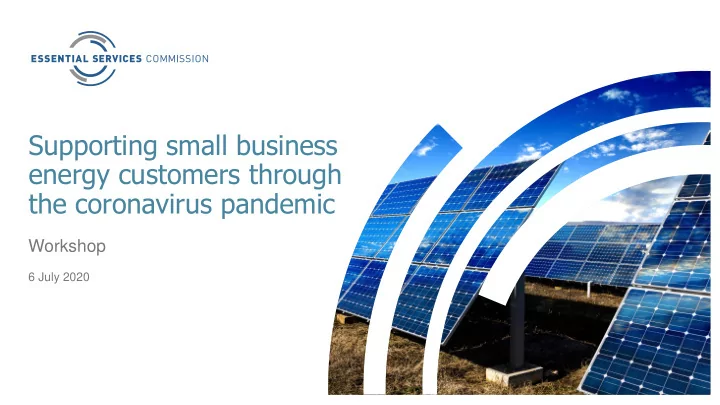

Supporting small business energy customers through the coronavirus pandemic Workshop 6 July 2020
Agenda • Welcome (Aaron Yuen) • Overview of proposals • Summary of our proposed reforms for small business customers • Questions to guide discussion • Next steps and close 2
Please use Slido to share your thoughts and questions 3
Overview of proposals Proposals to support Proposals to support Potential future network residential customers small business customers charge relief Payment Payment flexibility assistance 4
Our proposed reforms for small business customers • While our payment difficulty framework provides minimum entitlements to residential customers, there is no equivalent for small businesses. • From 1 October 2020, we propose that retailers must provide small business customers with minimum entitlements to payment assistance on a temporary basis, including: ‒ payment flexibility to help small businesses avoid getting into arrears with their retailer ‒ payment assistance to help small businesses in arrears pay for their ongoing energy use, repay their arrears and lower their energy costs. 5
Payment flexibility • We have proposed that if a small business contacts their retailer seeking flexibility in the payment of an upcoming energy bill, the retailer must make available the following forms of assistance: ‒ making payments of an equal amount over a specified period ‒ options for making payments at different intervals ‒ extending by a specified period the pay-by-date for a bill for at least one billing cycle in any 12 month period. Questions for discussion • Are our proposed payment flexibility entitlements appropriate for small business customers? • Are there any other forms of payment flexibility that would help small business customers avoid getting into arrears during this period? 6
Payment assistance – length of time for assistance • We are proposing that if a small business misses a bill pay-by-date, it will be entitled to: ‒ repayment of arrears over not more than two years by payments at regular intervals of up to one month ‒ advice from their retailer about payment options that would enable the repayment of their arrears over not more than two years ‒ assistance to help the small business lower its energy costs by completing a tariff check to find a contract that will most likely minimise the small business’ energy costs. Question for discussion • Is two years an appropriate length of time for small business customers to be asked to repay their arrears? 7
Payment assistance – eligibility criteria • We are proposing that the temporary entitlement to payment assistance is provided to any small business customer that misses a bill pay-by-date. Question for discussion • Should small business customers be eligible for these temporary entitlements if they miss a bill pay- by-date? 8
Length of temporary assistance program • We are proposing that the assistance program would cease accepting new entrants after six months after commencement of the rules or as otherwise extended. • Retailers would be obligated to continue providing a small business with the agreed payment arrangement under this temporary assistance program until the terms of that arrangement concluded. Question for discussion • Is six months an appropriate length of time for any temporary assistance program to be in place? 9
Any other measures we should consider? Question for discussion • Apart from what is proposed in our draft decision, are there any other measures we should consider to ensure consistent protections for small business customers? 10
Next steps • Written submissions should be made via Engage Victoria by 5pm on 14 July 2020 • Please contact the team on energyreform@esc.vic.gov.au for questions or to arrange a meeting. 11
Recommend
More recommend